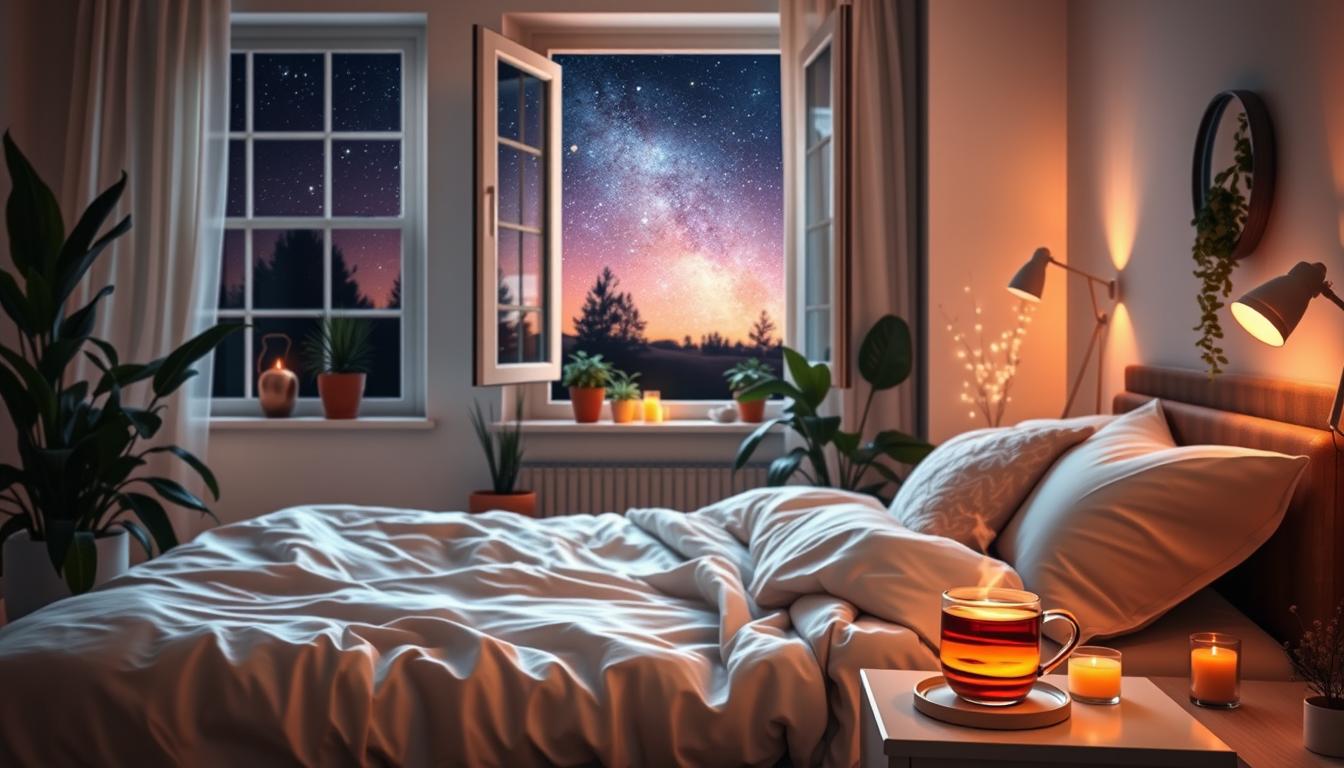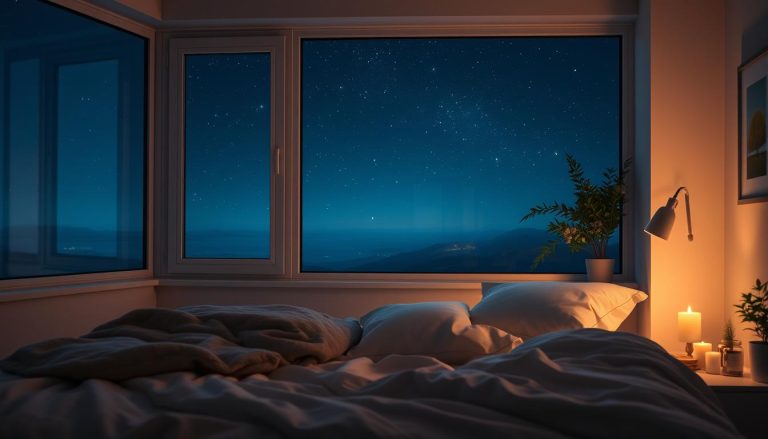Better Sleep Naturally: My Top Tips Unveiled
In today’s fast-paced world, getting quality rest can be tough. Many of us struggle with sleep deprivation, leading to fatigue and less productivity. But, I’ve found natural ways to improve sleep quality without using drugs.
By making simple lifestyle changes, you can get better sleep even when your schedule is packed. In this article, I’ll share my best tips to help you sleep better at night.
Understanding the Importance of Sleep Quality
Quality sleep is key to our well-being. It greatly affects our physical and mental health. Adults need at least seven hours of sleep each night. Less sleep can cause heart disease, obesity, and depression.
Good sleep does more than just make us feel refreshed. It helps our body get into a natural sleep cycle. Going to bed and waking up at the same time every day, including weekends, is crucial. This simple habit can improve our sleep a lot.
Long daytime naps can mess up our night’s sleep. To keep a regular sleep pattern, naps should be no longer than an hour. Regular exercise is good, but finish it a couple of hours before bed.
The environment where we sleep is also important. A dark and quiet bedroom is best for sleep. The right surroundings can greatly improve our sleep quality. Turning off screens before bed and avoiding heavy meals also helps.
Good sleep habits make us function better and live healthier, happier lives. Understanding the importance of sleep quality can change our mood, thinking, and health for the better.
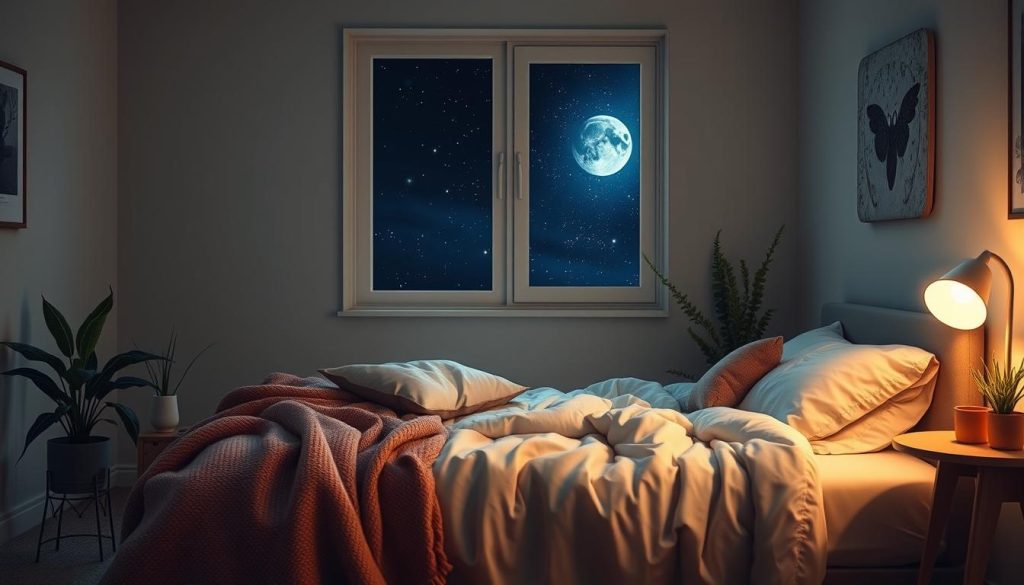
How Many Hours of Sleep Do You Really Need?
Getting enough sleep is key for good health. Most adults need seven hours of sleep each night. But, sleep needs change with age, lifestyle, and personal needs.
Newborns need 14 to 17 hours, and teens need 8 to 10 hours. This shows how sleep needs vary at different life stages.

As we grow, so do our sleep needs. Adults aged 18-64 should aim for 7 to 9 hours. Those over 65 should aim for 7 to 8 hours. These guidelines help ensure we stay mentally sharp, emotionally stable, and physically healthy.
- Newborns (0-3 months): 14 to 17 hours
- Infants (4-12 months): 12 to 16 hours
- Toddlers (1-2 years): 11 to 14 hours
- Preschoolers (3-5 years): 10 to 13 hours
- School-age children (6-12 years): 9 to 12 hours
- Teenagers (13-18 years): 8 to 10 hours
- Adults (18-64 years): 7 to 9 hours
- Older adults (65+ years): 7 to 8 hours
It’s not just about how long we sleep. The quality of our sleep matters too. Poor sleep can cause serious health problems. So, it’s important to focus on both the optimal sleep duration and quality for the best health.
Tips for Better Sleep Naturally
Getting good sleep can be tough, but there are ways to improve it. Keeping a regular sleep schedule helps my body know when to sleep. This is key, especially since many people struggle with sleep quality.
Establishing a Consistent Sleep Schedule
Going to bed and waking up at the same time every day helps a lot. It makes falling asleep easier and improves sleep quality. Adults need at least seven hours of sleep each night.
Sticking to this routine strengthens my body’s natural sleep cycle. It’s important for feeling rested and refreshed.
Creating a Bedtime Routine
I start winding down with activities like reading or meditation before bed. This signals to my body that it’s time to sleep. It’s also important to avoid screens because they can mess with my sleep hormones.
Studies show that doing the same things each night helps me sleep better. It makes falling asleep easier and improves overall sleep quality.
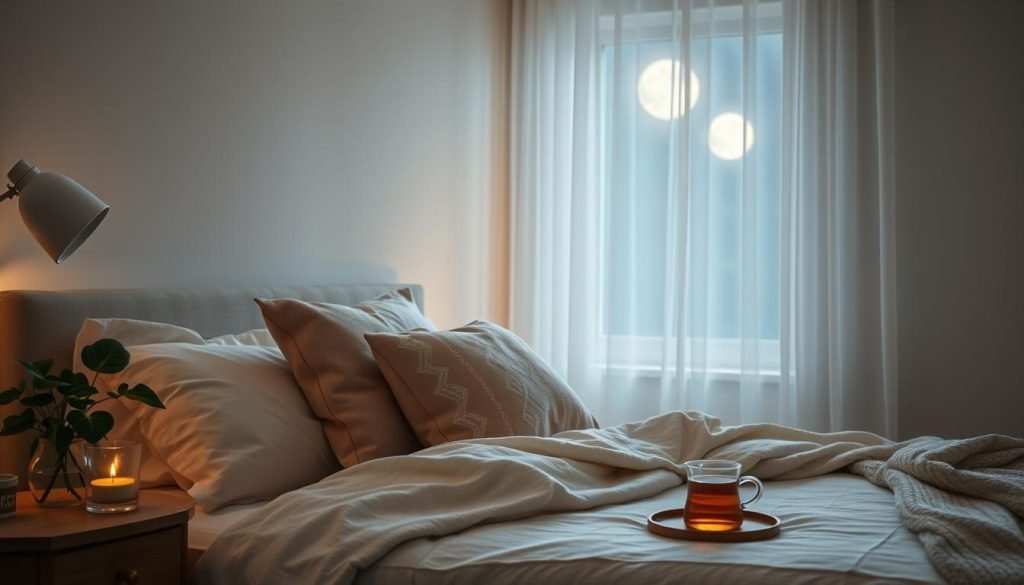
Relaxation Techniques for Better Sleep
Discovering effective relaxation techniques has greatly improved my sleep. Many adults struggle with sleep, so finding ways to calm the mind and body is key. I’ve found that mindfulness and breathing exercises before bed greatly improve my sleep.
Mindfulness and Meditation Practices
Adding mindfulness to my evening routine has been a game-changer. Activities like body scans or yoga nidra help me stay present. These practices lower stress, which is often a sleep blocker. Just a few minutes of meditation calm me down, making it easier to sleep.
Breathing Exercises for Calmness
Breathing exercises are a game-changer for insomnia. The 4-7-8 technique is my favorite. I inhale for 4 seconds, hold for 7, and exhale for 8. It slows my breathing and relaxes my body.
Diaphragmatic breathing also reduces stress and strengthens my diaphragm. Doing these exercises regularly leads to more peaceful nights.
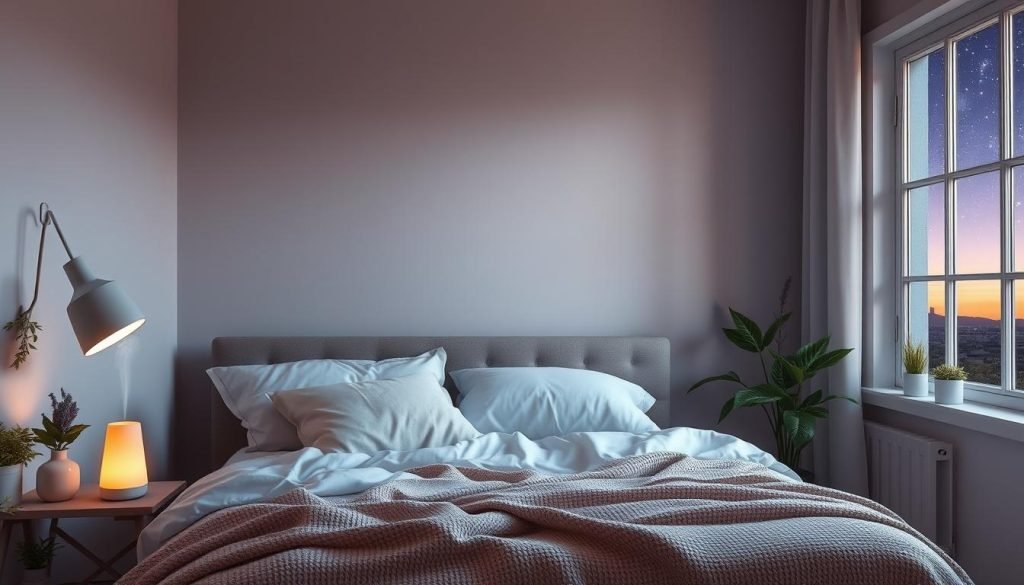
Create a Sleep-Friendly Environment
Creating a sleep-friendly environment is key for quality rest. By optimizing my bedroom, I can improve my sleep. Here are important areas to focus on:
Optimal Room Temperature and Lighting
Experts say to keep the room temperature between 60 to 67 degrees Fahrenheit. I try to keep mine around 65 degrees for the best sleep. This cool temperature helps me sleep better and feel more comfortable.
Lighting is also crucial. A dark bedroom helps produce melatonin, which helps me fall asleep. Dimming lights an hour before bed helps my body get ready for sleep.
Reducing Noise Distractions
A quiet space is essential for deep sleep. Noise can break up sleep, leading to more wake-ups and health issues. I use white noise machines or earplugs to keep my room quiet.
My bedding is also important. The right mattress, sheets, and pillows make me comfortable and prevent pain. I wash my sheets every two weeks to avoid dust mites and oils.
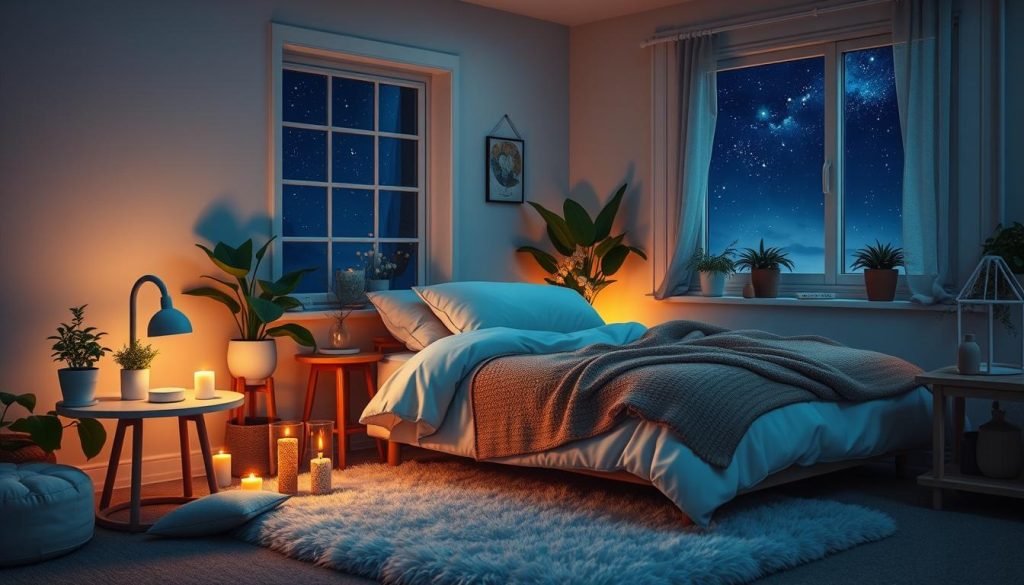
Sleep Hygiene Tips for a Restful Night
Good sleep hygiene is key for a good night’s sleep. Simple habits can make a big difference. Regular sleep patterns and comfy bedding are crucial.
The Role of Regular Sleep Patterns
Keeping a regular sleep schedule is vital. It tells your body when to sleep and wake. I try to sleep 7-8 hours a night.
Sticking to the same bedtime and wake-up time improves sleep quality. A nightly routine of relaxing activities also helps.
Importance of Comfortable Bedding
Good bedding is essential for a good night’s sleep. Invest in a quality mattress and pillows that fit your sleep style. Soft sheets and warm blankets make it cozy.
Choosing materials that keep you at the right temperature is important. When my bedding is just right, I sleep better.
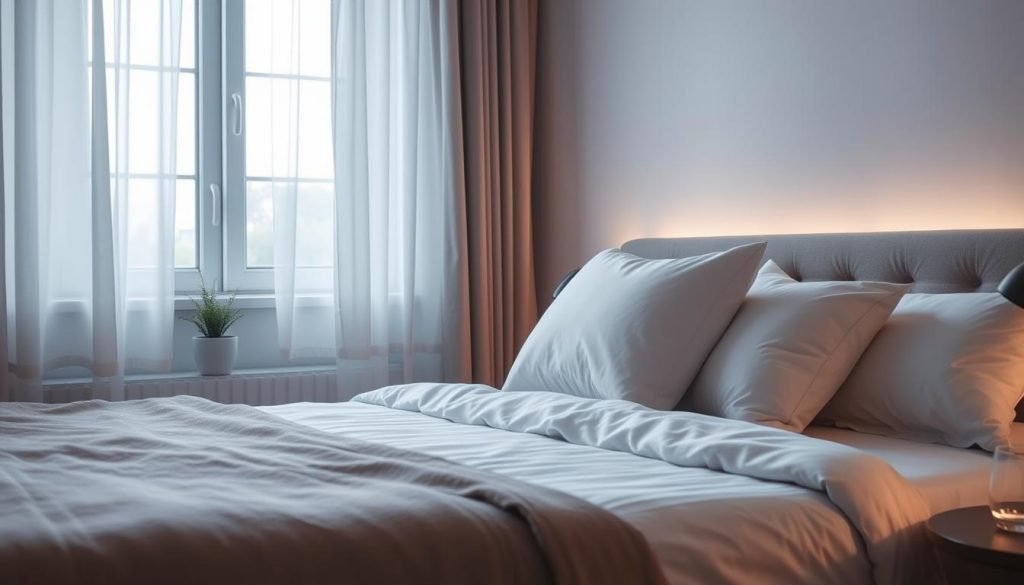
Effective Natural Sleep Remedies
Looking for ways to sleep better? Natural sleep remedies are a great choice. They offer a calming alternative to medication and improve sleep quality. Herbal teas and essential oils are popular for their sleep benefits.
Herbal Teas and Their Benefits
Herbal teas are a cozy drink before bed. Chamomile tea calms the mind and body, helping you relax. Valerian root tea also helps you fall asleep faster and sleep longer.
Drinking these teas can prepare you for a restful night.
Using Essential Oils like Lavender
Essential oils are also key for better sleep. Lavender oil, in particular, has been proven to improve sleep. It’s great for those with insomnia or those who just want to relax.
Diffusing lavender oil in your bedroom can make it a peaceful space. Adding essential oils to your bedtime routine can greatly improve your sleep.
Avoiding Stimulants Before Bedtime
Creating a calm bedtime routine is key for a good night’s sleep. It’s important to think about the effects of stimulants like caffeine and alcohol. These substances can really change how well you sleep.
The Impact of Caffeine on Sleep
The caffeine impact on sleep is clear. Even small amounts in decaf drinks can mess with your rest. Studies show that avoiding caffeine four hours before bed helps you sleep better. I’ve found that skipping coffee or tea before bed makes me fall asleep quicker and feel more awake in the morning.
How Alcohol Affects Your Sleep Cycle
Alcohol and sleep don’t mix well. It might make you fall asleep fast, but it messes up your whole sleep cycle. I’ve learned that the easy sleep at first is followed by bad nights and waking up a lot. Now, I try to stop drinking alcohol two hours before bed to sleep better.
Nutrition and Sleep: What to Eat for Better Sleep
The link between what we eat and how well we sleep is strong. Some foods help us sleep better, while others can make it harder. Knowing which foods affect sleep can help us choose better for a good night’s rest.
Foods That Promote Sleepiness
Adding certain foods for better sleep can really help. Tryptophan in turkey and fish boosts serotonin, key for sleep. Dairy and cherries have melatonin, and bananas and almonds relax muscles. I’ve found some snacks that are great for sleep:
- Peanut butter on whole grain bread
- Lean cheese on whole grain crackers
- Fortified cereal and milk
- Almonds
- Cherries
- Bananas
- Yogurt
Why to Avoid Heavy Meals Before Bed
When I plan my evening meals, I choose foods that help me sleep well. Turkey or fish with complex carbs like jasmine rice or sweet potatoes are good. Heavy meals can disrupt sleep, so I avoid simple carbs, fats, sweets, and spicy foods at night. Also, I limit caffeine, especially in the afternoon, to avoid sleep problems later.
A balanced diet with fruits, veggies, lean proteins, and complex carbs is key. It’s not just good for health but also for better sleep.
Engaging in Regular Physical Activity
Regular physical activity is key to better sleep. I’ve noticed that exercise helps me fall asleep quicker and wake up feeling better. Studies back this up, showing that even a little more activity can greatly improve sleep.
The Connection Between Exercise and Sleep Quality
At least 30 minutes of moderate exercise can improve sleep quality right away. The best time to exercise can vary. Some prefer morning workouts, while others do best 1 to 2 hours before bed. It’s interesting that exercise, no matter when, usually leads to better sleep.
Regular activity boosts slow wave sleep, which is crucial for feeling refreshed. This makes my nights more restful.
Recommended Types of Exercise for Better Sleep
To improve sleep, I suggest trying these exercises:
- Brisk walking
- Yoga
- Cycling
- Swimming
- Strength training
These activities are good for your health and help you sleep faster and wake less at night. It’s crucial to listen to your body and find what works best for you. Regular exercise improves sleep and overall health.
Managing Anxiety for Improved Sleep
Anxiety affects many adults in the United States, with over 19% having anxiety disorders each year. To improve sleep, managing anxiety is key. Two effective ways are keeping a pre-sleep journal and taking time to relax before bed.
Keeping a Pre-Sleep Journal
Writing in a pre-sleep journal helps manage anxiety. It lets me write down my thoughts and feelings, clearing my mind for sleep. Studies show that journaling can reduce stress and improve well-being.
By writing down my worries, I can let them go. This brings calm and helps me sleep better.
Setting Aside Time to Wind Down
Having time to relax before bed is important. A consistent routine tells my body it’s time to sleep. Mindfulness, deep breathing, or yoga can lower stress hormones.
The Role of Natural Light in Regulating Sleep
Natural light is key to a good sleep cycle. Morning light boosts my energy and alertness. Sadly, only 51 percent of Americans get enough morning light.
This lack of light messes with our circadian rhythm. It affects not just sleep but our overall health.
In the afternoon, things don’t get better. Only 53 percent of people get enough light. Natural light is much stronger than office lights.
Electronic devices give off blue light in the evening. This can mess with our melatonin levels. It’s best to avoid screens before bed.
Shift workers face extra challenges. About 16% of workers have non-traditional hours. This can lead to sleep problems, mood issues, and even accidents.
Light therapy can help adjust our internal clock. It involves using a lamp that mimics daylight. It’s important to avoid sleeping with lights on to prevent sleep issues.
How to Fall Asleep Faster Naturally
Finding it hard to fall asleep can be really tough. So, I’ve gathered some tips to help you sleep better naturally. One important thing is to avoid screens before bed. The blue light from screens can stop your body from making melatonin, which is key for sleep.
Try to stop using screens at least an hour before you go to bed. This helps create a better sleep environment.
Limiting Screen Time Before Bed
Instead of watching TV or scrolling on your phone, try relaxing activities. Reading or listening to calming music can help. It lets you disconnect and get ready to relax.
Also, keep your room cool. Aim for a temperature between 60°F and 67°F. This cooler environment helps you fall asleep faster.
Practicing Relaxation Activities if Awake
If you can’t sleep, try relaxation techniques. Mindfulness meditation and progressive muscle relaxation can help. They reduce stress and anxiety, which can keep you awake.
Take a few minutes to focus on your breath or use guided imagery. If you still can’t sleep after 20 minutes, get out of your room. This lets you start fresh later. These practices have really helped me sleep better and faster.

